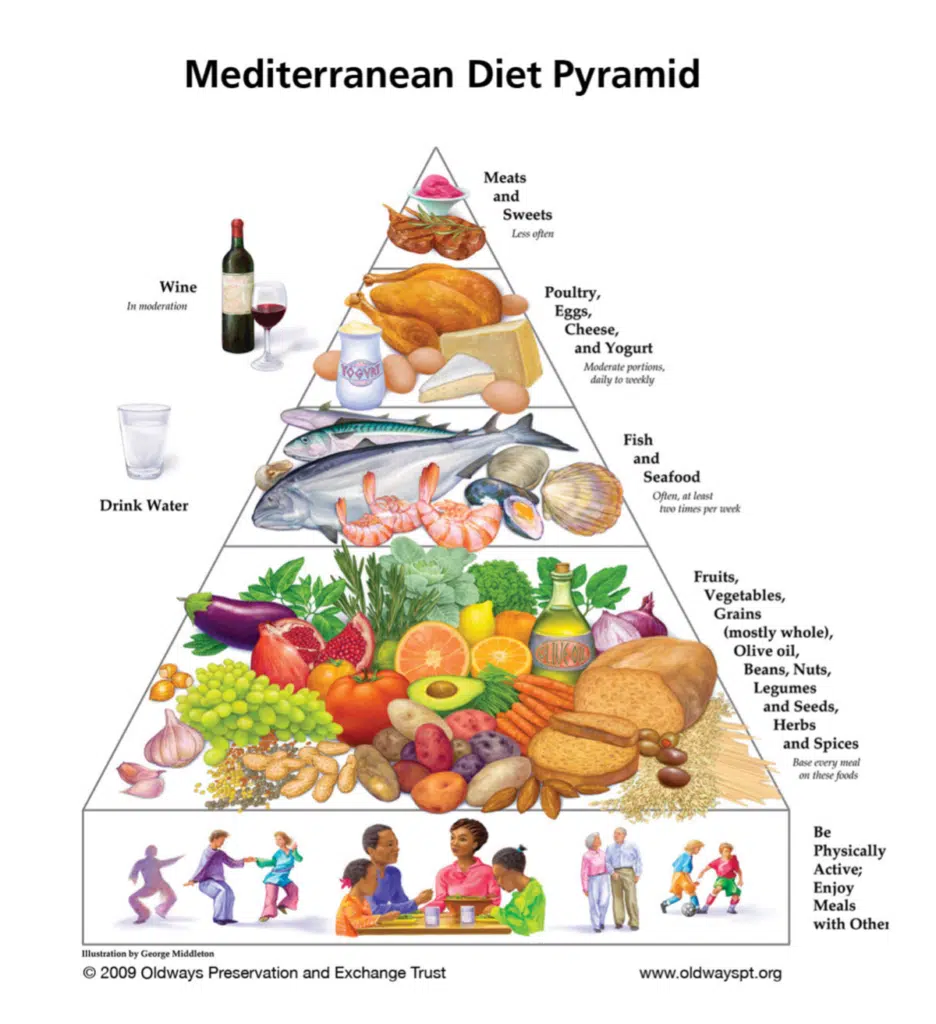You’ve undoubtedly heard of a Mediterranean diet and know about all its health benefits. But, did you also know that it has also been shown to help with IBS as well as anxiety and depression?
In this recently published TANDIM trial, participants with medically diagnosed IBS were randomly allocated into a “Mediterranean diet” or “habitual diet” and monitored for 6 weeks. After 6 weeks, the group following a Mediterranean diet had improvements in IBS symptoms as well as anxiety and depression. Interestingly, they did not reduce the FODMAPs in their diet during the trial either. This trial shows that you don’t need to focus on restriction and exclusion to improve IBS. Instead, making a few dietary changes like eating more nuts and including more olive oil can be beneficial to improving both IBS and mood disorders.
Psst… want the shortcut? Apply to work with us one-on-one and have a customised endometriosis friendly nutrition plan for you with an expert dietitian & nutritionist here at Everyday Nutrition.
The really good news is that a Mediterranean diet isn’t really a diet at all. Instead, it’s more a way of eating, and a way of life. Based on traditional eating patterns from countries bordering the Mediterranean like Spain, Italy and Greece, a Mediterranean diet includes a high intake of fruit, vegetables, olive oil, whole grains, nuts, legumes and seafood. Red meat, poultry, dairy and red wine are allowed in smaller amounts, but nothing is off limits.
Another important part of a Mediterranean style diet is HOW you eat. Meals are enjoyed with friends and family savouring the company and the food. In addition, it’s important to be active whether its walking to the shops, doing chores or going for a bike ride. It doesn’t matter what you do, as long as you enjoy it.
How to follow a Mediterranean diet:
Eat daily:
- Olive oil on salads, in cooking or dipping bread – aim for 3 tbsp per day.
- Include vegetables or fruit at all meals and snacks.
- Nuts & seeds with meals and for snacking.
- Choose whole grains e.g. oats, wheat, brown rice, quinoa, barley, buckwheat etc.
- Legumes, beans and lentils.
Eat weekly:
- Fish and seafood
- Yoghurt & cheese
- Chicken, turkey and other poultry
Limit: red meat, lollies and sugary drinks to special occasions.
Drinks:
- Water, water and more water – especially if you have IBS.
- Red wine occasionally with meals.
- 1-2 coffees per day, sit down and enjoy these too.
The other good news is that a Mediterranean diet has also been shown to:
- Reduce the risk of heart disease.
- Protect against brain aging and reduce the risk of Alzheimer’s disease.
- Reduce the risk of type 2 diabetes.
- Reduce the risk of certain types of cancer.
- Improve non-alcoholic fatty liver disease.
- Reduce inflammation throughout the body.

Final Thoughts
Not only does a Mediterranean diet improve IBS it also improves mental health and decreases chronic disease risk. Contrary to other dietary approaches for IBS, it does not eliminate or restrict your favourite foods while still providing surprisingly positive outcomes. If you’re ready to take the next step, our expert IBS dietitian team are ready and waiting to support you. Don’t hesitate to book an appointment today to resolve digestive issues and start enjoying food again.








5 Comments
Thanks so much for your helpful advice. Been following LF for 3 years mostly successfully.
Your suggestions have made my life easier.
Thats great Judith, so glad to see you getting reuslts ?
So for those of us with IBS, do you recommend trying low fodmap or Mediterranean as our first line of defense? What determines which is best to try?
Great question Annette! I always think the most liberal diet possible is the best diet for anyone. In which case, I would start with the Mediterranean diet as it doesn’t actually mark any foods as completely off the menu. Once we know what impact that has, then reassess and think if any further tweaks are needed. Happy to see you 1:1 and have a chat more specifically about your situation if that helps. ?
Thanku so appreciate your advice. Must incorporate 3 tbspn’s of olive oil. I know this diet is healthy.
I have a lot of roasted vegetables in my diet. I cook vegan Les with a little brushed on Olive Oil, is this OK.